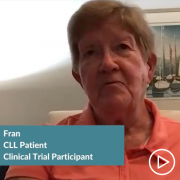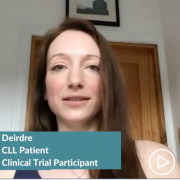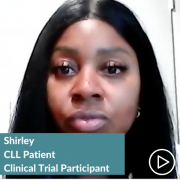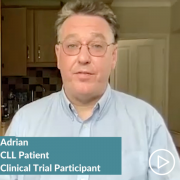Tag Archive for: chronic lymphocytic leukemia clinical trials
Chronic Lymphocytic Leukemia: Adrian’s Clinical Trial Profile
Chronic Lymphocytic Leukemia: Adrian’s Clinical Trial Profile from Patient Empowerment Network on Vimeo.
Chronic lymphocytic leukemia (CLL) patient Adrian’s diagnosis came as a shock when he’d been feeling healthy. Watch as he shares about his unique patient journey – as a former physician and past experience supporting clinical trials – about the value clinical trials can provide in making treatment decisions and access to treatments for improved patient outcomes.
See More from Patient-to-Patient Diverse CLL Clinical Trial Profiles
Related Programs:

|

|
Transcript:
Adrian:
Hi, I’m Adrian., I’m 50 years old. And in 2017, When I was 46, I was diagnosed with chronic lymphocytic leukemia (CLL). It happened as a bit of a shock to me, actually. I’ve been quite healthy quite well earlier that week, I’d gone walking in the mountains in Switzerland, but I collapsed one day on the way home from work, and was diagnosed with pneumonia. And during that illness, they realized that my immune system wasn’t working too well, and then my lymphocyte count was high, and I was diagnosed with CLL. I was put on watch and wait, which for some people can last a decade or more, but for me, it only lasted 15 months.
As a doctor, I obviously know a fair bit about the clinical research, and so I did a bit of research on my own. It was going to be difficult for me to get one of the selective treatments outside of a trial. So I wasn’t really sure what to do, and I became quite pressured and quite stressed about how to make this decision, and it might sound odd, but it felt like a bit of a relief almost to allow a computer to make the choice for me. Obviously, it’s a bit weird getting to the point where you realize, actually, a doctor doesn’t know what’s best for you, you don’t know what’s best for you, and your research doesn’t give you a clear answer, but to me that’s the ideal time for a trial because then you don’t know if you know what’s best for you, then you probably ought to go down that road, but if you’re uncertain and you think, well, any of these three treatments that were on offer to me through the trial would be good, they all work, they went to slightly different side effect profiles, and it was hard to know which would work best for me as an individual.
So, I quite like the idea that in a way, as an individual, one of these treatments would be better for me, and it might not be the same one that would be better for another patient, and so even with the data, we wouldn’t know for sure which of the best treatment was for me. Well, at least this way, it’s a computer making the decision randomly for me, so I’ve got an equal chance of getting whatever is the right treatment for me. But the other major thing, of course, to me was the idea or giving something back, and I guess this is where my professional background did make the difference, because I’d spent more than a decade working in clinical research myself and encouraging other doctors and helping other doctors who are running these trials and helping to supervise them, helping to run the trials and design the trials, and so I figured that as I obviously benefited in the community, benefited from so many other people who had gone before and put themselves forward for these trials, so there was a altruistic part of me that wanted to give back.
None of these drugs would be available to us now if other people hadn’t taken the risks, if you like, and taken on board these clinical treatments and sometimes actually by taking on a treatment a bit earlier than you might otherwise have been able to get it. You might actually gain a benefit, and I’ve certainly got friends who took treatments that are now considered old school, but when they took them, say 20 years ago, they were very much new school, and if they have to take and then they would probably have died.
The treatment itself worked really well, and I was actually randomized to the old-fashioned treatment. It’s well known what the side effects are and what you’re dealing with. I did get quite unwell at the beginning and I probably would have that happened no matter what treatment I had. You kind of get used to being in the hospital, and they know what to do, and they know how to look after you. And so at the end of the treatment cycle, I got to the point where my cancer was completely in remission, to the point that they weren’t able to detect any cells using the tests that they have. And the doctors told me that there’s almost certainly some cancer cells left there, and it will at some point come back in my case, although sometimes, even with these blood counts, they can get rid of it all together.
So I’m left with that uncertainty of knowing when is it going to come back? But for me personally, I’m also been left with quite a bit of damage to the immune system, so I do deal with infections. I do try and make the best of how I am today. I have some limitations, I’m not able to work. I’m stronger than I was at my weakest point, and I know for a lot of people, they get a lot better than I have many people bounced straight back and are able to work, or even able to work all the way through treatment. I’m very glad I had the trial though, I feel like my information may help to help people decide which treatments to use in the future, and I’d definitely go for another trial if I was offered it again.
I know we don’t like to have unnecessary tests, but it just means that you feel like you’ve been looked after well and assessed well, and they should explain to you in great detail what the options are, and I think it’s very important if you’re considering a trial to think very carefully about the options that are being given to you. It’s really important to make sure you understand what all the options are that you are being offered and then you’re happy to take any of them, and you understand the benefits and risks of each of them, and why it is that your doctor feels that these treatments are suitable for you, if there’s one treatment that you feel very strongly about that you really want to have or that you think is definitely best for you, you’re probably better off trying to get that treatment outside of the trial, because it takes a certain mindset to be willing to allow a computer to decide for you, and sometimes you not to even know what treatment you’re on.
I knew what treatment I was on, sometimes you won’t know, and some people find it quite difficult to deal with and so if I was you, I’d leave it to the people who feel more comfortable, but the only way you’ll know really is by looking into it. And so, I think going for that screening appointment, understanding, having all your questions answered, making sure you know what’s involved and whether there are going to be any additional visits, whether that’s going to be a problem for you. And what that all looks like so that you know what you’re getting yourself into because you might have to come to more visits and spend longer at the hospital and such like, but at the same time as a reward involved because you feel like you’re being well looked after and you’ve usually got a phone number of a nurse or research or that you can ring any time with any of your questions, and so that’s a definite bonus.
So, for me, a clinical trial is an opportunity for you as an individual to get a treatment that may well not be available to you outside of the trial, and so that can be a benefit to you and also gives you the opportunity to have extra care potentially. But also, it’s an opportunity for us to give back, and I think for society as a whole, it’s really important that patients are willing to volunteer so that we can get new medicines. Because without clinical trials we’ll never get new medicines we’ll just be stuck with the old ones, and when you look at blood cancer as a whole, it wasn’t that many years ago where there really weren’t very many treatments at all, where you know it was chemotherapy or nothing, and thanks to the sacrifices of many patients who’ve gone before, we’ve now got a wealth of treatment and more coming down all the time, and therefore an improved quality of life hopefully, but certainly also an improved quantity of life. So yes, trials can actually save lives down the way down the line, even if it’s not right, and they can certainly save later lives, and sometimes they might give you a treatment that would work for you that wouldn’t be available for you otherwise.
Chronic Lymphocytic Leukemia: Deirdre’s Clinical Trial Profile
Chronic Lymphocytic Leukemia: Deirdre’s Clinical Trial Profile from Patient Empowerment Network on Vimeo.
Chronic lymphocytic leukemia (CLL) patient Deirdre experienced a different diagnosis and treatment path as a female CLL patient diagnosed at age 35. Watch as she shares about her patient journey, the value of clinical trials, her advice to other patients, and things she wishes she had approached differently in her CLL care.
See More from Patient-to-Patient Diverse CLL Clinical Trial Profiles
Related Programs:
Transcript:
Deirdre:
My name is Deirdre. I was diagnosed with chronic lymphocytic leukemia (CLL) at the age of 35 in 2018, and I’ve been on the medical trial in UK for the past, coming up to two-and-a-half years. I apparently had CLL for quite a number of years before I was diagnosed. It came up in through different ways, through being fatigued even after having lots of sleep, I’d feel very tired. I used to feel quite unfit. I’d get different injuries. A few of them I had to get looked at through X-rays and nothing was found, and I’d sometimes while doing arm exercises my arms felt kind of hollow and lots of different bruises which came up very easily and took ages to heal. Lots of different colds, infections and blues, which would take a lot longer than a normal person, and I just generally was feeling quite run down for a really long time. CLL wasn’t even something I’d even heard of before I was diagnosed.
Someone my age, a female, under the age of 40 was incredibly rare to have CLL. And it wasn’t until I actually had kind of a random blood that it was brought up that I had quite a high lymphocyte count. There was no real, real concern just that you should get this checked out, so it was a few months until I could see a consultant. And he said, for my age “It’s probably nothing because you’re under 40.” I had at the back of my head, my lymph node was quite enlarged, which I had actually mentioned before to my GP. I hadn’t felt very well at the time, so he just said, “Oh, it’s probably just your lymphocytes are up, and lymph nodes are nothing to be concerned about.” But, my consultant, she said, “this is a bit concerning, and you could have CLL.” And then I started with researching CLL, and I realized that all of the bullet points online were things that I’d been going through around my mid-20s to my mid-30s, so I’d had these kind of vague symptoms that all started making sense. So, when I was actually diagnosed, my oncologist, he was kind of relieved really. And I said,” Don’t worry. I know I’ve got CLL, and that’s what it was.”
So, I was diagnosed with CLL, and my oncologist said that I had accelerated CLL, which meant that I actually had to forego watch and wait. My CLL had gotten to a point where I couldn’t do that. I had to start treatment ASAP. So, I had to have a few different tests, different scans, so I could start treatment. My particular biomarkers, I was researching myself, looking at different treatments that I felt would be best for me, and I came across the FLAIR trial. I was speaking to my oncologist about how could I possibly take part in the FLAIR trial in the UK and he said have to have quite a few different tests just to see if I was a suitable candidate. I was found to be a suitable candidate for the FLAIR trial, and I was slightly hesitant, because I read that I would have to have more observation.
I actually quite liked having my CLL looked at more, so I was quite positive about starting the trial and so I got into the FLAIR trial. I was fortunate enough to be randomized into trying the two drugs that I particularly wanted that I thought would be best for me. So far, I’ve been very, very fortunate. One thing that I’ve learned through having CLL is that everyone’s CLL is slightly different. So with my particular biomarkers, I felt that the drugs that I was randomized on would be working for me, it depends on your situation, which drug would be best for you. I was very fortunate that I got on the trial, and I’m very, very happy that I’m on the trial.
I would say to people who are considering starting a trial to really speak to your oncologists, speak to your doctors.
If you can go online, there are particular CLL forums online, you can speak to quite a few other people who are on trials and ask them questions. Again, everybody’s CLL is different, so just because one drug worked for someone doesn’t necessarily mean that the drug would work in the same way for you. But, I really would recommend the trial, the care that I had from my nurses and doctors and oncologists had been amazing. I do think I’ve had such fantastic care. I do have to have maybe a few more tests to be more scans than usual, a few more biopsies, but I would have to have some anyway, and they’re actually not that bad. I think a lot of these things, I would read about them online perhaps, and sometimes they seem worse than they actually are. You imagine, them to be worse than they really are. I would really recommend, getting on to a medical trial if it’s available to you, and if you can get on the trial.
If I could go back to my pre-diagnosed self, I absolutely definitely would have said, pay more attention to how you feel your body and speak to your doctor about it, but don’t just rely on one doctor. Do keep an eye on these things, which is over many years, all these small things like knots and fatigue and bruising and everything that they all seem like it’s not connected. I wish I could go back and get checked out properly even if I maybe had to go private healthcare to get myself checked out, because deep down I knew there was something not right. And I wish I’d been a bit more confident in getting the observation that I needed to have a full blood count and have everything looked at. I wish I could go back and maybe get a second opinion.
My medical trial in total is going to be six years, and I’m very fortunate, I started actually before COVID- 19, so all the times they had to go into hospital were beforehand. I’m still on the same drugs now and I’m doing really, really good. I think everyone needs to decide for themselves and think, you know what’s best for me is a medical trial best for me or just having normal treatment, if it’s best for them. Everybody’s CLL is different, but the medical trial has been fantastic for me, and I would really recommend it to anyone who is suitable for trial.





